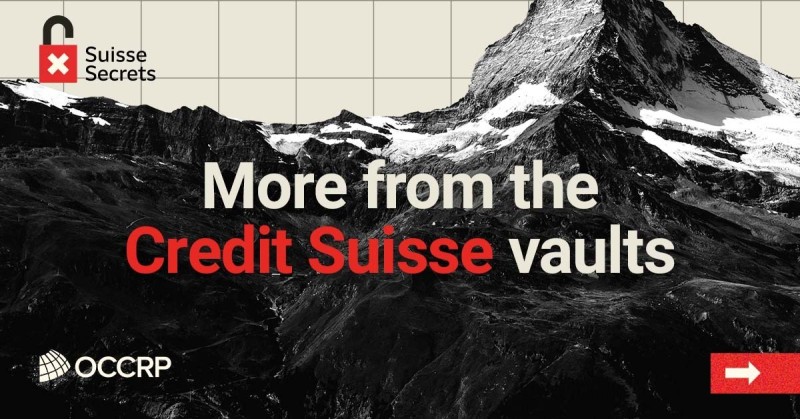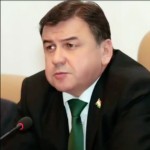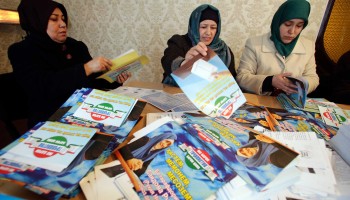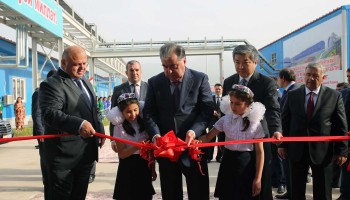Politician, powerbroker, alleged mafia kingpin: Qosim Rohbar has long had a reputation in Tajikistan.
After starting out in the Communist youth movement in 1989, he rose through the political ranks after the collapse of the Soviet Union and in the aftermath of the country’s brutal civil war. He became a close ally of authoritarian President Emomali Rahmon — the longest-serving current ruler of any post-Soviet state — winning the influential positions of governor of the Sughd region and minister of agriculture.
At the same time, Rohbar has become known as a shady operator who has amassed unexplained riches. Media reports, published under pseudonyms or anonymously due to Tajikistan’s repressive political climate and history of attacks on journalists, allege he and his brothers at one point took near total control over economic life in Sughd through bribery and racketeering.
One U.S. diplomatic cable from 2008 said Rohbar was “widely reputed to be a mafia kingpin” who ruled Tajikistan’s restive north on behalf of President Rahmon’s southern faction.
Social media posts by Rohbar’s wife give glimpses of luxurious houses that hint at the family’s wealth. But no one has ever had proof of his fortune — until now.
Leaked banking data from the Suisse Secrets project shows that Rohbar had an account at Swiss banking giant Credit Suisse between 2004 and 2011. At its maximum, in July 2010, it held 8.8 million Swiss francs, which was roughly $8.5 million at the time.
The Suisse Secrets Investigation
Suisse Secrets is a collaborative journalism project based on leaked bank account data from Swiss banking giant Credit Suisse.
Throughout that period, Tajik law forbade civil servants from having accounts in banks outside the country.
For just over a year in 2006-2008, Rohbar may have been able to legally have the account due to changes in the law and exceptions made for lawmakers. During all other years, including when he opened the account, the law applied to him.
“This law was amended several times, but, one way or another, civil servants were always forbidden to have bank accounts abroad or engage in entrepreneurship,” Shokirjon Khakimov, a Tajik lawyer affiliated with the opposition Social Democratic Party, told OCCRP.
Rohbar did not respond to requests for comment.
In response to inquiries from OCCRP and Süddeutsche Zeitung, Credit Suisse said it could not comment on individual client relationships and rejected “allegations and inferences about [its] purported business practices.” (Click here to read the bank’s full response to the Suisse Secrets project).
It’s unclear how Rohbar was able to amass so much money. While public officials’ salaries are not published, in 2016 the head of Tajikistan's central bank stated that he earned roughly $640 a month, which he said was similar to other high-ranking state positions.
Rohbar’s career took off after Rahmon won the presidency in 1994, in a vote that the U.S. State Department and Human Rights Watch said was rife with ballot-stuffing, fraud, and voter intimidation.
Rohbar was appointed governor of the Sughd region in 1996. For a decade he stayed in that position, consolidating Rahmon’s hold on the country’s north. He also simultaneously served in Tajikistan’s parliament starting in 1995 and then its Senate from 2000 to 2006.
In 2008, Rohbar was made minister of agriculture, giving him oversight of Tajikistan’s cotton industry, one of the country’s top foreign currency earners. During his time in office, which ran until 2015, the UN’s International Organization for Migration reported that Tajikistan used child and forced labor for the harvest.
Human rights lawyer Steve Swerdlow said Tajikistan’s political system is riddled with corruption, with local politicians obtaining illicit funds and channeling them to Rahmon’s family.
“Corruption is absolutely endemic and rife throughout the system,” he said. “Governors and even mayors are really powerful players in funneling resources and collecting bribes and sending them up the chain.”
One explanation for Rohbar’s wealth could be through private business. Tajik law forbids state officials from engaging in commercial activities, but OCCRP found that his brothers appear to have multiple business interests.
According to Tajikistan’s tax registry, Rohbar’s brother Zafar Qosimov owns Tirozi Jahoni, a real estate management firm that in turn co-owns a micro-credit organization called Matin. Another brother, Jafar Qosimov, owns a wholesaler in Moscow that sells coffee, tea, cocoa, and spices.
A 2006 U.S. embassy cable from Tajikistan published by Wikileaks mentions that a brother of Rohbar was a “major partner” of mobile operator Indigo Cellular in Sughd. The cable cited the CEO of MTC Corporation, which it said part-owned Indigo, but did not name the brother, or give details of his stake or role.
In 2007, Sweden’s Teliasonera acquired Indigo and its competitor Somoncom, which it merged to form TCell. An investigation by OCCRP and Swedish television channel SVT later revealed that Teliasonera had paid hundreds of millions of dollars in bribes for licenses in Uzbekistan. Investigations by the United States, the Netherlands, and Sweden led to nearly $1 billion in fines.
OCCRP reached out to Rohbar’s brothers for comment, but received no response.
Rohbar served as chairman of the president’s Regional Development Commission until earlier this year, when he became the acting mayor of Gissar, a small city outside Dushanbe.








